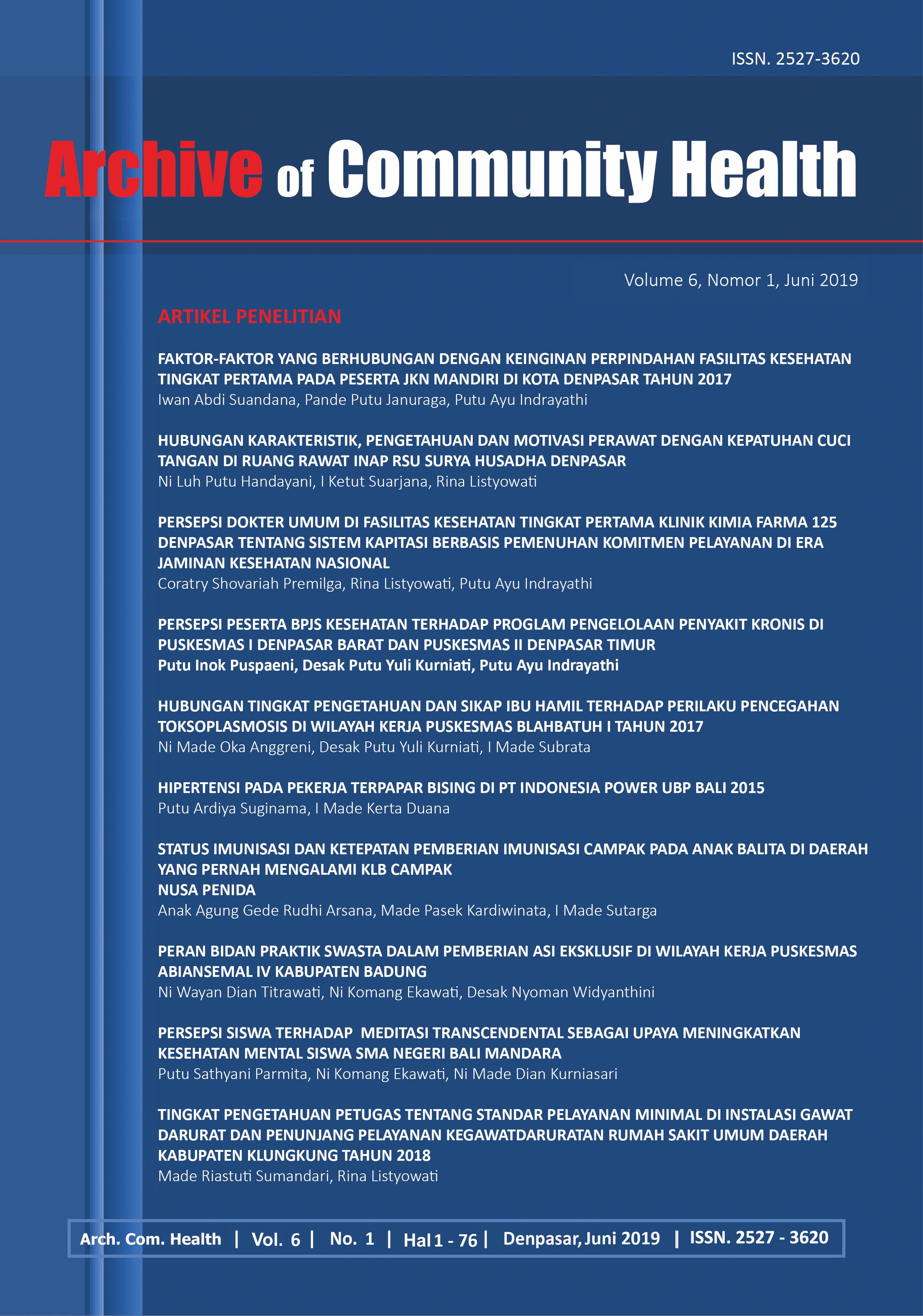PERSEPSI DOKTER UMUM DI FASILITAS KESEHATAN TINGKAT PERTAMA KLINIK KIMIA FARMA 125 DENPASAR TENTANG SISTEM KAPITASI BERBASIS PEMENUHAN KOMITMEN PELAYANAN DI ERA JAMINAN KESEHATAN NASIONAL
Abstract
ABSTRAK
Sistem kapitasi berbasis pemenuhan komitmen pelayanan yang diatur dalam peraturan BPJS Kesehatan No 2 tahun 2015 mulai diberlakukan per 1 Januari 2017. Adanya perubahan pola pembayaran kapitasi tentunya akan mendapatkan berbagai macam persepsi dokter umum sebagai PPK di FKTP Klinik Kimia Farma 125 Denpasar. Persepsi ini penting untuk diketahui karena akan mempengaruhi perilaku yang akan diberikan oleh dokter umum terhadap pasien JKN. Penelitian ini bertujuan untuk mengetahui efektivitas penyelenggaraan dari sistem kapitasi JKN berbasis pemenuhan komitmen pelayanan. Desain penelitian ini adalah deskriptif kualitatif, dipilih delapan orang dokter umum di Klinik Kimia Farma 125 Denpasar yang ditentukan sesuai kriteria sebagai informan. Penelitian dilakukan pada bulan Mei hingga Juli 2017 bertempat di Klinik Kimia Farma 125 Denpasar. Metode pengambilan data menggunakan metode wawancara mendalam (indepth interview) yang dilakukan selama 20 hingga 40 menit. Hasil penelitian persepsi dokter umum terhadap sistem kapitasi berbasis pemenuhan komitmen pelayanan dimana sebagian besar dokter umum setuju besaran tarif kapitasi yang diberikan oleh BPJS Kesehatan cukup untuk melaksanakan pelayanan kesehatan, sistem kapitasi dirasa dapat meningkatkan kesejahteraan dokter. Standar pelayanan yang diberikan pada era JKN mengikuti standar yang telah diatur oleh BPJS Kesehatan. Dalam pelaksanaannya upaya komitmen pelayanan dilakukan dengan cara menambahkan poli untuk mengurangi waktu antrian. Indikator komitmen pelayanan yang diatur dapat menjadi motivasi untuk meningkatkan mutu pelayanan. Untuk memaksimalkan pemberlakuan sistem kapitasi berbasis pemenuhan komitmen pelayanan, diperlukan upaya tambahan dalam bentuk program promotif dan preventif. BPJS Kesehatan untuk mengelola layanan dan komunikasi dengan dokter diperlukan sosialisasi yang maksimal terhadap program promotif dan preventif untuk meningkatkan kunjungan sehat.
Keywords: Persepsi, Kapitasi, Pemenuhan Komitmen Pelayanan
ABSTRACT
The capitation system based on fulfilling the service commitments regulated in BPJS Kesehatan No 2 tahun 2015 began to take effect as of January 1, 2017. The change in capitation payment patterns will certainly get a variety of perceptions of general practitioners as PPK at FKTP Kimia Farma 125 Denpasar Clinic. This perception is important to know because it will affect the behavior that will be given by general practitioners towards JKN patients. This study aims to determine the effectiveness of the implementation of the JKN capitation system based on fulfilling service commitments. The design of this study was descriptive qualitative, selected eight general practitioners at the Kimia Farma 125 Denpasar Clinic which were determined according to the criteria as informants. The study was conducted in May to July 2017 at the Kimia Farma 125 Clinic in Denpasar. The data collection method uses the in-depth interview method (indepth interview) which is conducted for 20 to 40 minutes. The results of research on the perception of general practitioners of the capitation system based on the fulfillment of service commitments where most general practitioners agree that the amount of the capitation tariff provided by BPJS Health is sufficient to carry out health services, the capitation system is considered to be able to improve the welfare of doctors. Service standards provided in the JKN era followed the standards set by the Health BPJS. In the implementation of the service commitment efforts carried out by adding poly to reduce queuing time. Indicators of service commitment that are set can be a motivation to improve service quality. To maximize the implementation of a capitation system based on fulfilling service commitments, additional efforts are needed in the form of promotive and preventive programs. BPJS Health to manage services and communication with doctors requires maximum socialization of promotive and preventive programs to increase healthy visits.
Keywords: Perception, Capitation, Fulfillment of Service Commitments














